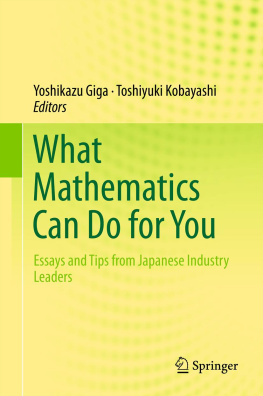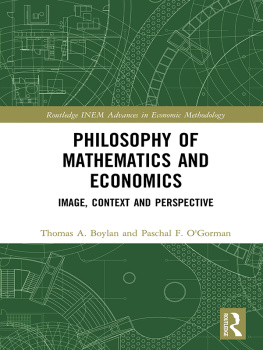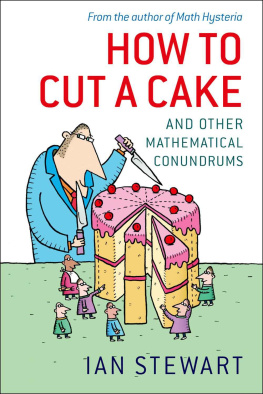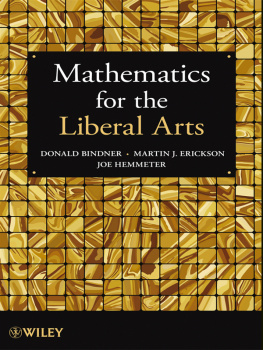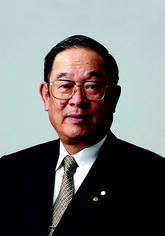A Dialogue Between a Mathematician and Toyotas Chairman: Think, Think, and Think Again
What Lies Beneath
Kobayashi (K): I believe that there are a variety of things that are fundamental but rarely perceived, that are important but too obvious to attract our attention. Do you think the value of honesty for a company is such a thing? I surmise that a sound company does not have to think about the value of honesty so often because people there just take it as a matter of course. On the other hand, dishonestyneedless to say fraud, but also pretending to know everything without performing investigations, which I also consider a kind of dishonestyseems to result in a long-term loss even though it may produce a large short-term gain.
Today I would like to talk with you, by highlighting things that we are usually unaware of. Of course, there are two opposite cases for these things, namely, because they are so natural that we take them for granted, or simply because they are not important.
Mathematics might be the former case. The smoother mathematics is functioning within society, the more people are unaware of it. Mathematics is thought of as fundamental in science and technology. Nevertheless it might go well for the time being even if we ignore mathematics and forget thinking about reason and logic. But this would not be the right way if we hope to achieve long-term success.
If mathematics could be useful in the real world, how? Since I am a mathematician, I am afraid that my answer to this question would be biased. Instead, I would like to hear opinions of a Japanese business leader.
Cho (C): How clear your explanation is! Since I was a law student at the university, I did not take math classes after finishing my sophomore year. So, my knowledge of mathematics is very limited, especially when my conversation partner is a professional. However, I believe mathematics is the science that has the most logical and reasonable structure.
(Mathematical) Reason and Sentiment
C: Reason is antithetical to sentiment. It is very important to use rationality while organizing information. I think mathematics is the best practice for developing our reason.
Math Is Fun
C: Until I was a sophomore in high school, I was more interested in judo and kendo than classroom studies. I studied math very hard over the next 2 years. I had been told by my father that the familys economic circumstances did not allow me to go to a private university. So I had to study eight subjects, including Math I and Math II. But I liked math because math valued logical thinking.
My father also graduated from a law school, and he was a very logical-minded man. When I was in junior high and high school, he used to talk me down logically by asking the reason for my argument. When I said something off the top of my head, I was often scolded, with him saying, You have to think more logically. When I studied math, I realized how my fathers advice was valuable. In the second year of high school, I decided to major in the humanities in college, but math was still fun to me. Looking back, the relationship with my father had an influence on my bent toward mathematics.
Mathematics and Kaizen
C: After graduating from the university, I started working for Toyota. Six years later, I was told to do Kaizen (improvement of production processes), although what I had majored in was law, not engineering. Kaizen is an engineering persons job, I thought. I was embarrassed and tried to persuade my boss to reconsider his decision, but in vain. I have now been doing Kaizen for 15 years. Looking back on these 15 years, I find I learned many things, mainly two lessons.
The first lesson I learned was the fact that production processes consisted of many numbers. It seems there is something related to what Prof. Kobayashi mentioned previously with regard to the term honesty: If people in a factory do their jobs based on numbers, there can be little room for cheating and fudging. To be based on numbers is the same thing as to be based on honesty. Production planningwhich sort and how many vehicles will be produced, how much sales are expected, how much the cost price will be, etc.is totally based on numbers. Without numbers, we can say nothing but subjective remarks like That vehicle looks cool or This one provides a comfortable ride. When we have to develop a new car, we cannot depend on such empty words. What we need is information that is expressed with numbers, such as bulk weight, noise level, vibration level, etc. By numbers, I am not talking about technical calculations that are conducted in laboratories. I am talking about simple arithmetic, such as addition, subtraction, multiplication and division. Numbers and arithmetic are what Toyotas 300,000 employees share as the fundamental communication tool.
Ask Why Five Times
C: The first lesson I learned from Kaizen is the importance of numbers, which are objective tools for us rather than abstract ideas. On the other hand, the second lesson I learned has something more fundamentally mathematical. Doing mathematics and being logical seem to me to be rather the same thing.
All things have their causes. Everyone knows that. However, people in our company do not stop here, but keep thinking that All things have their causes, and all causes also have their real causes. They should track back from causes to causes until they find real causes. To do so, they should ask themselves the question why at least five times.
They should go to factories themselves, observe whats going on there, and use their own hands to measure and count. They should not make their tasks self-contained. When there is a good business, there is a sound logic behind it. Everything derives from logic and numbers, and nothing in the world will happen by chance. So, I was always tracking back problems until I found effective measures. I kept asking questions like Why does the cost price keep rising? Why did this machine break down? and Why are there so many defective parts? After thoroughly asking myself such questions, I was able to understand the real causes of a particular problem.
One day in a factory, I encountered a strange case. The blade in a certain machine, which was supposed to last at least 1 month, was dead in the first week. I guessed the supplier of the blade might have mixed in the wrong ingredients, but it was not the case. Then, why? What made the blade break so quickly? That the machines blade broke once a week meant that one could observe the instance of a break if one kept watching it for a week! We worked in rotation and kept watching it. We noticed that the blade broke because iron scraps wound around it and exerted a strong force on it. Then, why did the scraps wind around the blade? We found many plausible causes for this phenomenon. The solution we finally found was to attach a cutting device to the machine, so that the produced scraps were made too short to wind around the blade.

